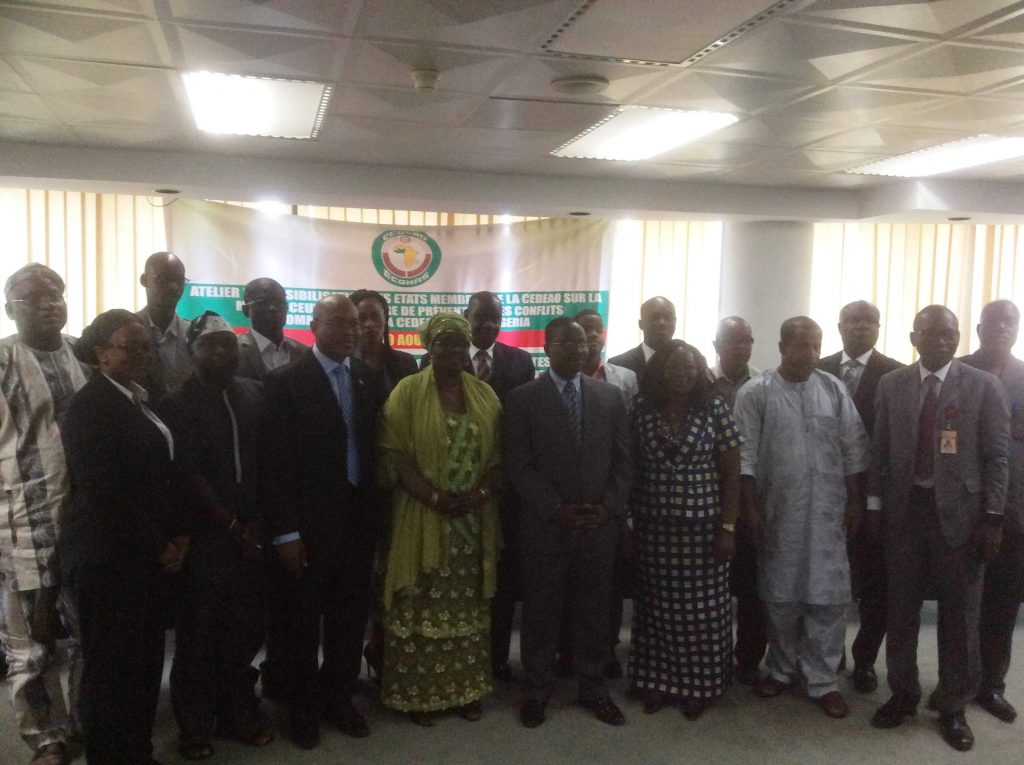ECOWAS Member States Representatives Work out Means of Implementing Conflict Prevention Tenets in the Region
| Abuja, 29th August 2016
Representatives of ECOWAS Member States are meeting in Abuja, Nigeria to iron out means of implementing the ECOWAS Conflict Prevention Framework (ECPF). The Framework has been put together to engender a more stable, conflict-free region where the envisaged greater atmosphere of peace can help in the realization of the ECOWAS integration goals by pushing conflict prevention and peacebuilding up the political agenda of the governments of the region. Declaring the two-Day sensitization Workshop open on the 29th of August 2016, the ECOWAS Commissioner for Political Affairs, Peace and Security (PAPS) Mrs. Halima Ahmed enthused that the Abuja convergence would serve as a platform to enhance the synergy between the Commission and respective Ministries from where the participants are drawn. Noting that since inception in 2008, there has been limited knowledge and ownership of the ECPF by the Member States who signed it into existence, the Commissioner observed that due to the occurrence of many security challenges in the region, there have been limited programmes developed by the Commission to generate awareness about the ECPF in Member States. Mrs. Ahmed reported that through the support of the Government of Denmark, the Secretariat dedicated to the operationalization of the ECPF has been taking active steps geared towards ensuring ownership and maximum utilization of the ECPF by ECOWAS Focal Point Directorates, Member States, Civil Society and Development Partners while serving as an interface between the ECOWAS Commission and all relevant stakeholders.
The Commissioner further remarked that the security situation in the region has become a concern at the national, regional and international levels since the terrorist attacks in Cote d’Ivoire, Burkina Faso, Niger, Nigeria and Mali just as the increasing incidence of clashes between farmers and herdsmen, rural banditry, electoral violence, ethno-religious violence are matters of urgent concern that requires preventive interventions. Participants who were mostly drawn from the Ministries of Justice and Internal Affairs of Member States were implored by the Commissioner to consider regional dimensions of peace and security when designing and implementing national programmes. “Through a partnership with the ECOWAS Commission, we can embolden the governments of the region to prioritize the development of policies which are geared towards preventing conflicts and diffusing tensions, thereby ensuring the peace and stability of our region” She added. Earlier, the ECOWAS Director of Political Affairs Dr. Remi Ajibewa gave a historical background to the conflict situation in West Africa within the context of global realities stating that the ECPF came about in recognition of the nexus between peace, security and development According to him, one of the key objectives of the ECOWAS Conflict Prevention Framework is to build awareness and anticipation and strengthen capacity within Member States and Civil Society Organisations (CSOs) to enhance their roles as principal constituencies and actors in conflict prevention and peacebuilding. During the Workshop, there were presentations of the ECPF web portal, a synthesis of studies on ECPF by Centre for Democracy and Development (CDD), the Kofi Anan International Peace Training Centre (KAIPTC) and the Goree Institute done by Dr. Abiodun Onadipe as well as an overview of peace and security situation in each Member State The ECOWAS Heads of State and Government adopted the ECPF as a legal document which specifies the roles and responsibilities of the ECOWAS Commission, Member States, Civil Society Organizations and Development Partners in strengthening the human security architecture in West Africa. |




